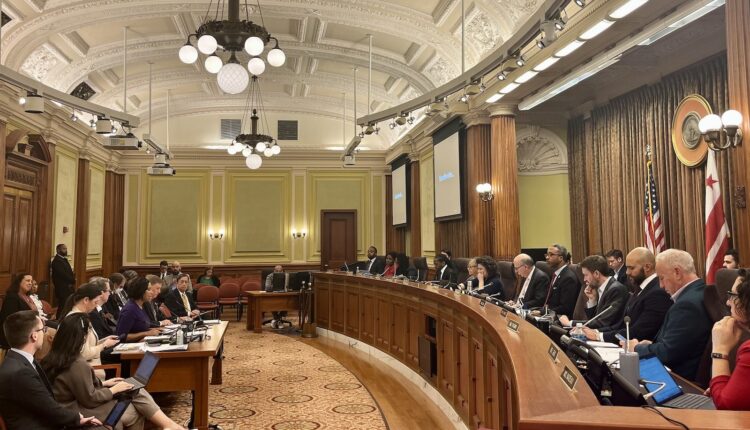
Erin Palmer and Katharine Landfield: It’s time for the DC Council to use its full power on the budget
The struggle for DC’s autonomy has never been more urgent, as federal-level attacks destabilize our local government and stall our local budget process. President Donald Trump’s slashing of federal jobs and vital programs is causing pain to residents and a contraction of DC’s tax base, and Congress is prohibiting us from spending our locally raised money. Mayor Muriel Bowser has delayed releasing her budget proposal for the next fiscal year, citing the congressional chaos.
Meanwhile, the DC Council is simply standing by, with no public plan, no shared vision, and no clear strategy for achieving a budget to meet the needs of residents. In this moment of crisis, however, DC needs a council willing to exercise its power as a co-equal branch of the District government in setting a collective agenda for DC’s budget.
Chair Phil Mendelson must lead the DC Council in holding a public work session to determine its DC-wide budget priorities and a strategy to achieve them. In this challenging budget cycle, anything less leaves the council uncoordinated and less powerful, and its members less able to meet the needs of the people they serve.
Currently, the mayor wields a significant advantage in the DC budget process: She sets the agenda, controls the narrative, and drives budget priorities. The council, in contrast, responds only after the mayor’s proposal is released, scrambling within its siloed committees to make adjustments and secure funding, without an overarching plan. In practice, this means the council surrenders much of its power to shape the direction of the city. That’s always been a problem. But in a year like this, with federal interference, a tighter revenue forecast and major funding gaps, it’s a recipe for failure.
We saw this dynamic play out last year. DC was — and still is — facing an extreme housing affordability crisis, growing homelessness, and widespread housing insecurity. Yet the council’s Committee on Housing was left to fund these needs largely on its own — taking from some (also important) programs under its purview to fund others. Without council-wide support or significant cross-committee collaboration, legislators did not provide enough funding to meet the moment. Residents who needed stability were left behind.
This year, the risks are even bigger. The council’s Committee on Health is facing potentially as much as a $1 billion shortfall, driven by a likely reduction in DC’s FMAP — the federal medical assistance percentage, which determines the federal share of Medicaid costs — and cuts to various health care programs. At the same time, the Committee on Human Services faces major funding shortages due to the expected loss of federal support for critical safety net programs.
None of these committees can fix these major gaps by moving money around among the programs under their respective oversight portfolios. Without a coordinated plan to address DC’s most urgent needs, working-class and poor Black and brown communities will be hit first and hardest. The residents who already struggle will be further destabilized.
The DC Council must respond with urgency, unity and clarity.
An emergency DC Council public work session either before or immediately after Mayor Bowser submits her budget proposal, now expected on May 15, would give the council its best chance to navigate the current budget minefield. It would allow the council to coordinate earlier, set shared goals, and develop a clear and unified strategy.
The council doesn’t need to seek new power — it already has it. What’s needed now is the will to use that power, together, to meet this moment and deliver for DC residents. This is a time for leadership. Let’s not waste it.
Erin Palmer is chair of the Fair Budget Coalition’s executive committee, and Katharine Landfield is the coalition’s senior advocacy strategist.
About commentaries
The DC Line welcomes commentaries representing various viewpoints on local issues of concern, but the opinions expressed do not represent those of The DC Line. Submissions of up to 850 words may be sent to editor Chris Kain at chriskain@thedcline.org.


Comments are closed.